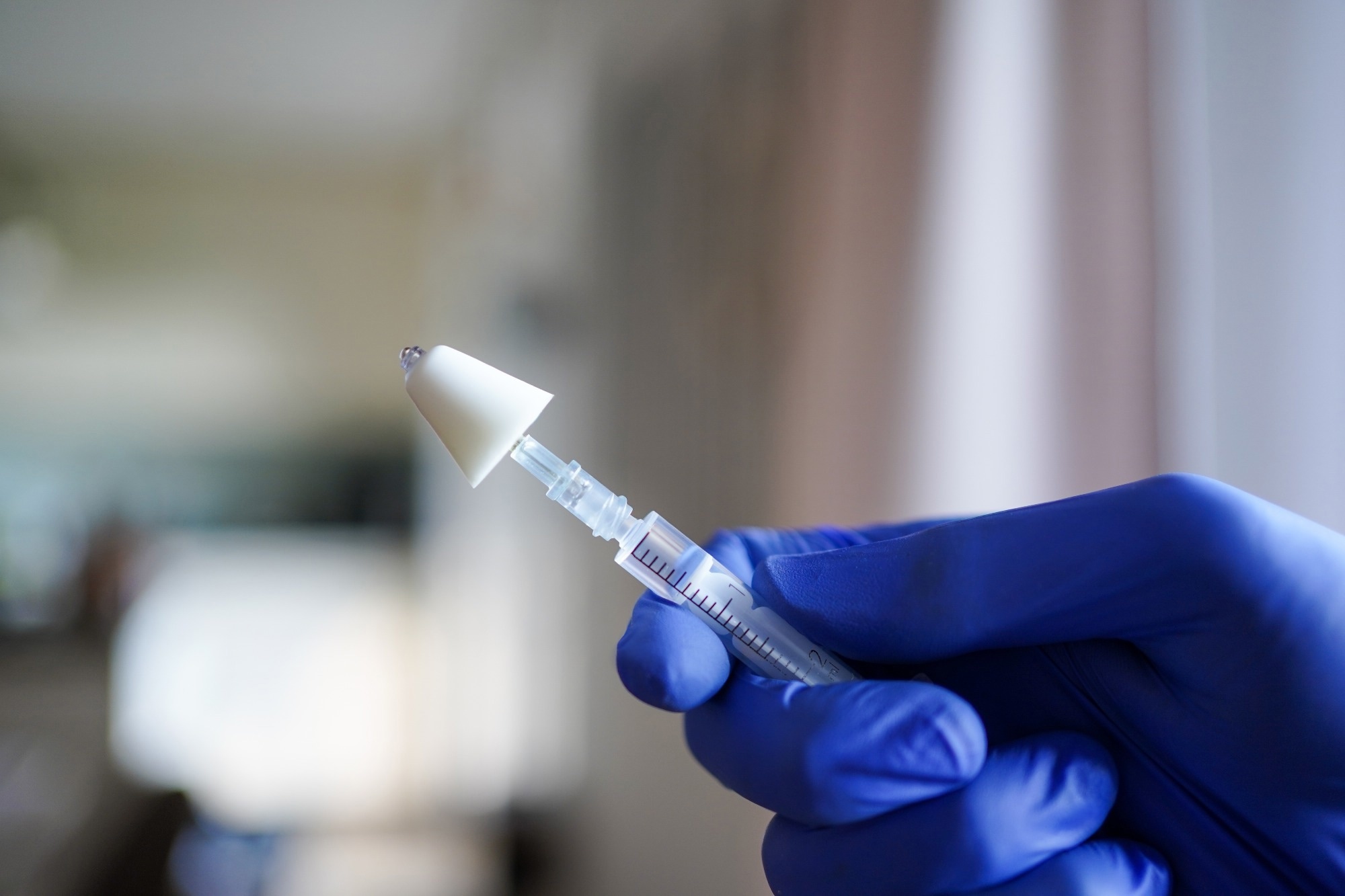Intranasal COVID-19 vaccine shows promise in reducing severe symptoms
In a recent study published in the journal eClinicalMedicine, researchers examined the efficacy of the single-dose intranasal spray vaccine (dNS1-RBD) against symptomatic severe acute respiratory syndrome coronavirus 2 (SARS-CoV-2) infection.
 Study: Intranasal COVID-19 vaccine shows promise in reducing severe symptoms. Image Credit: TG23 / Shutterstock
Study: Intranasal COVID-19 vaccine shows promise in reducing severe symptoms. Image Credit: TG23 / Shutterstock
The COVID-19 pandemic has caused an unprecedented impact on global public health and the economy. The causal agent, SARS-CoV-2, has acquired numerous mutations that increase viral fitness and improve transmission and immune escape. A substantial body of evidence indicates that intramuscular COVID-19 vaccines protect from infection, hospitalization, and death.
Nevertheless, the emergence of the Omicron variant and its sub-lineages has reduced the efficacy of both the primary and booster series against symptomatic disease. Therefore, broadly effective and safe vaccines with high acceptance are necessary. Intramuscular COVID-19 vaccines elicit neutralizing antibodies against the viral spike. However, antibody levels in the respiratory tract are significantly lower than in the circulation.
As such, mucosal vaccines have drawn substantial attention given their ability to induce robust local immune responses in the respiratory tract compared to intramuscular vaccines. For instance, a phase 3 trial of the mucosal vaccine, dNS1-RBD, revealed that the two-dose regimen induced broad protection against Omicron in infection-naïve individuals and had a favorable safety profile.
About the study
In the present study, researchers examined the effectiveness of a single dose of the dNS1-RBD vaccine against symptomatic COVID-19 during the Omicron wave. The study was conducted in Xiamen, China. Eligible participants were SARS-CoV-2 infection-naïve healthcare workers aged 18 or older who were not lactating or pregnant and had received only inactivated vaccines or none.
The dNS1-RBD vaccine was intranasally administered. Participants who did not receive this dose were controls. Healthcare workers were screened daily for SARS-CoV-2 with reverse-transcription polymerase chain reaction (RT-PCR). This screening program was modified in December 2022, allowing workers to indicate their infection status based on a rapid antigen test (RAT) or RT-PCR.
A survey was administered to obtain data on symptoms and their severity and duration. The primary outcome was symptomatic COVID-19, defined as a positive RAT or RT-PCR with any of these symptoms: fever, cough, sore throat, runny nose, muscle pain, upset stomach, diarrhea, loss of smell or taste, nausea, headache, fatigue, and dyspnea, among others.
Vaccine effectiveness (VE) was estimated using Cox proportional hazards models and adjusted for age and other baseline parameters. The Kaplan-Meier method was used to estimate cumulative incidence curves. The impact of vaccination on acute symptoms was assessed using logistic regression.
Findings
The study included 1,391 participants. Of these, 1,256 subjects were previously immunized with an inactivated vaccine; the remainder were non-vaccinated. Forty-four participants were excluded from the analysis for failing to undergo screening or report their daily health status. Overall, the analytic sample comprised 1,347 individuals with follow-up data. Of these, 536 received the single-dose dNS1-RBD vaccine, and 881 were controls.
Participants were followed up for 1–26 days, regardless of their vaccination history. During the follow-up, 323 and 557 participants in the vaccine and control groups developed symptomatic COVID-19, respectively. The VE for symptomatic infection was 23.6%, whereas the adjusted VE was 19%. Sixty-two infected participants developed grade 3 or higher symptoms that require medical attention.
The adjusted VE was 11.6% and 55.3% against symptomatic COVID-19 and infections with grade 3 or higher symptoms, respectively, among participants who previously received an inactivated vaccine. Further, among participants with no vaccination history, the adjusted VE was 87% and 84.2% against symptomatic disease and infection with grade 3 or higher symptoms, respectively.
Findings were similar in a sensitivity analysis that excluded participants infected within three days after vaccination. Among infected controls, common symptoms were cough, fever, fatigue, runny nose, and sore throat. The incidence of some grade 3 symptoms was substantially reduced with the dNS1-RBD vaccination. Moreover, vaccination appeared to minimize the duration of fatigue and muscle pain.
Conclusions
In sum, the researchers examined the efficacy of the single-dose dNS1-RBD vaccine among healthcare workers without an infection history. This single-dose regimen was more protective against infections with grade ≥ 3 symptoms than those with mild symptoms. Further, vaccination with dNS1-RBD appeared to slightly attenuate respiratory symptoms like sore throat, runny nose, and cough. The adjusted VE estimates were lower among participants with a prior vaccination history than those without previous vaccination. Further studies are needed to corroborate these findings.
- Mi H, Chen Q, Lin H, et al. Short-term effectiveness of single-dose intranasal spray COVID-19 vaccine against symptomatic SARS-CoV-2 Omicron infection in healthcare workers: a prospective cohort study. eClinicalMedicine, 2024, DOI: 10.1016/j.eclinm.2023.102374, https://www.thelancet.com/journals/eclinm/article/PIIS2589-5370(23)00551-5/fulltext
Posted in: Medical Research News | Disease/Infection News | Pharmaceutical News
Tags: Antibodies, Antibody, Antigen, Coronavirus, Coronavirus Disease COVID-19, Cough, Diarrhea, Dyspnea, Efficacy, Fatigue, Fever, Headache, Healthcare, Muscle, Nausea, Omicron, Pain, Pandemic, Polymerase, Polymerase Chain Reaction, Public Health, Respiratory, SARS, SARS-CoV-2, Severe Acute Respiratory, Severe Acute Respiratory Syndrome, Sore Throat, Stomach, Syndrome, Throat, Transcription, Vaccine

Written by
Tarun Sai Lomte
Tarun is a writer based in Hyderabad, India. He has a Master’s degree in Biotechnology from the University of Hyderabad and is enthusiastic about scientific research. He enjoys reading research papers and literature reviews and is passionate about writing.